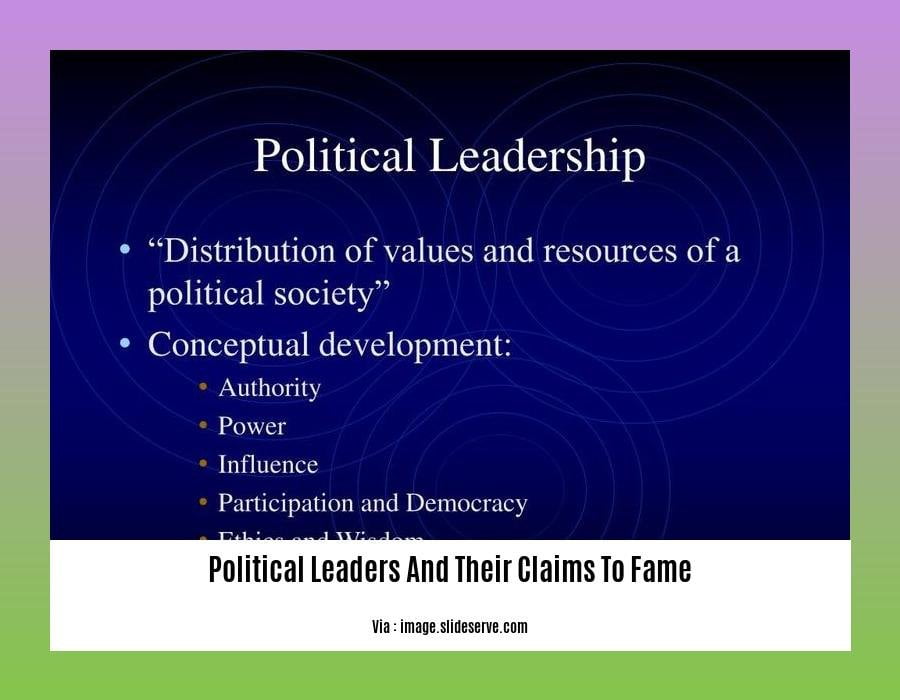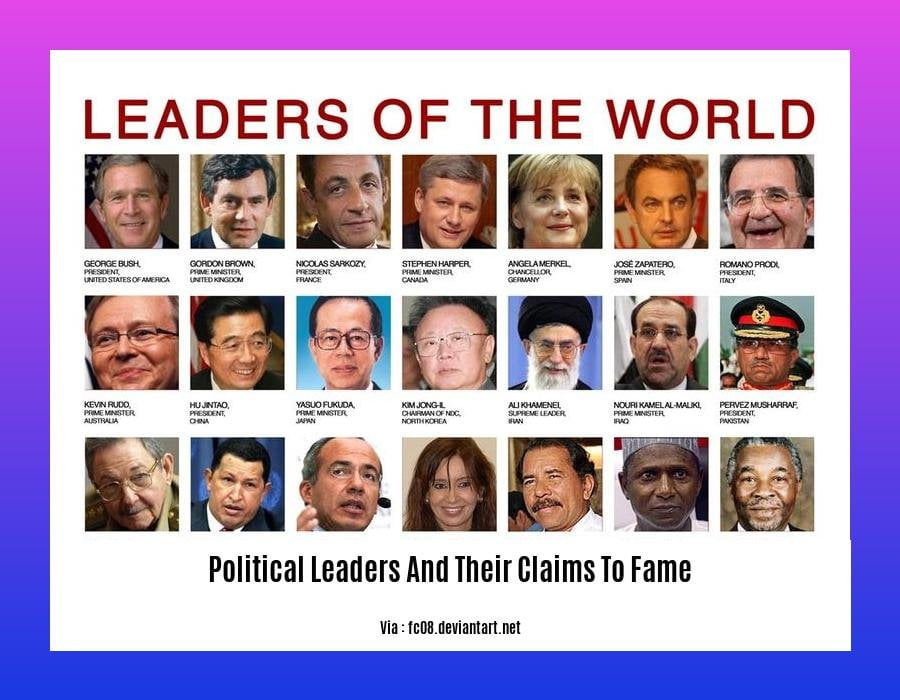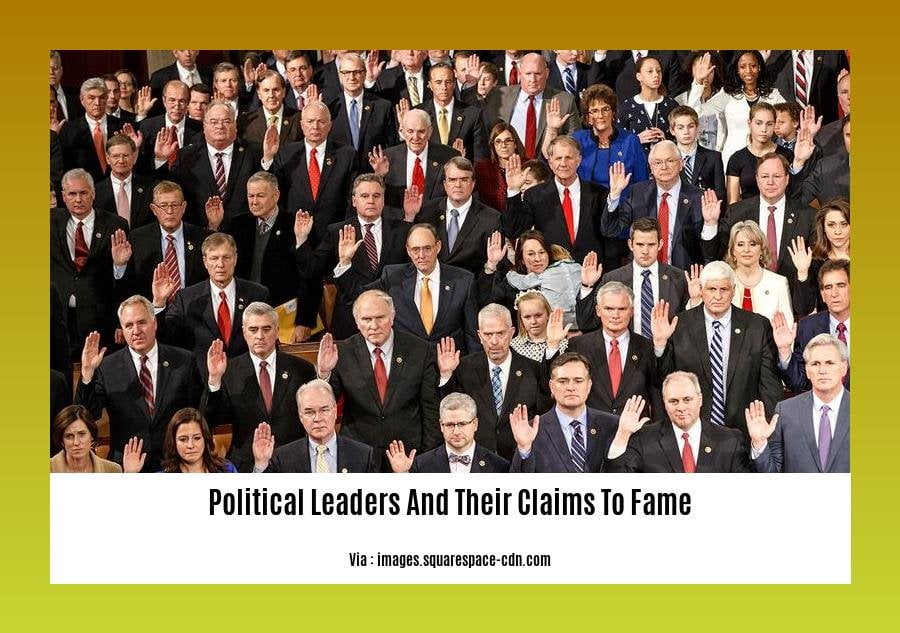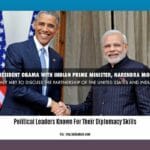[Political Leaders and Their Claims to Fame: A Critical Analysis] Delve into the captivating chronicles of political figures and their enduring legacies. This article unveils the strategies, ambitions, and impacts that have shaped the course of history. Through meticulous scrutiny and expert analysis, we unveil the substance behind their claims to fame, exploring their strengths, weaknesses, and lasting influence on both domestic and international affairs.
Key Takeaways:

- There is a lack of focus on training and supporting political leaders.
- Various organizations can contribute to political leader development.
- Celebrities are actively participating in politics, influencing democratic principles.
- Traditional notions of political leadership centered on extraordinary qualities.
- Modern leaders need to connect with their constituents on a personal level.
Political Leaders and Their Claims to Fame
Political leaders and their claims to fame are as diverse as the individuals themselves. From inspiring visions to transformative policies and even infamous actions, their legacies continue to shape the world we live in today.
Visionary Leaders
Nelson Mandela, the anti-apartheid revolutionary and first black president of South Africa, is widely recognized for his unwavering commitment to racial equality and his role in dismantling the oppressive apartheid regime.
Mahatma Gandhi, the Indian independence leader, is renowned for his advocacy of nonviolent civil disobedience. His teachings have inspired countless social justice movements around the globe.
Reformers and Innovators
Franklin Delano Roosevelt, the 32nd president of the United States, is credited with leading the country out of the Great Depression with his New Deal policies, which expanded social welfare programs and stimulated economic growth.
Angela Merkel, Germany’s first female chancellor, has been praised for her strong leadership during the 2008 financial crisis and the European refugee crisis. Her pragmatic and consensus-building approach has earned her respect both at home and abroad.
Controversial Figures
Adolf Hitler, the dictator of Nazi Germany, is a prime example of a political leader whose actions have had a profoundly negative impact on the world. His racist ideology and aggressive foreign policy led to the Holocaust and the outbreak of World War II.
Joseph Stalin, the communist dictator of the Soviet Union, is known for his brutal purges and suppression of dissent. His repressive regime resulted in the deaths of millions of people.
Contemporary Leaders
Barack Obama, the 44th president of the United States, is the first African American to hold the office. He is credited with expanding healthcare coverage through the Affordable Care Act and negotiating the Iran nuclear deal.
Xi Jinping, the president of China, has overseen rapid economic growth and strengthened China’s global influence. His authoritarian leadership style has drawn both praise and criticism.
Discover the legendary famous political leaders and their remarkable triumphs that have shaped the course of history. Explore the greatest accomplishments of iconic figures whose vision and determination left an indelible mark on the world. Witness the renowned political leaders’ major feats that transformed nations and inspired generations.
Controversial Figures
Throughout history, controversial figures have had undeniable influence on the world. Some have ignited revolutions, while others have sparked controversy and even hatred. Let’s explore some of the most iconic and divisive individuals:
Visionary Leaders
Nelson Mandela, the anti-apartheid revolutionary, fought for equality in South Africa. Mahatma Gandhi, an advocate for nonviolent resistance, led India to independence from British rule. Their actions shaped history.
Reformers and Innovators
Franklin Delano Roosevelt led the United States out of the Great Depression with his New Deal policies. Angela Merkel, Germany’s first female Chancellor, navigated the 2008 financial crisis and the European refugee crisis. Their reforms changed the landscape.
Controversial Figures
Adolf Hitler, the dictator who led Germany into World War II, stands as an example of the destructive power of hatred. Joseph Stalin, the repressive Soviet leader, killed millions in purges. Their actions left an indelible mark on humanity.
Contemporary Leaders
Barack Obama, the first African American president of the United States, expanded healthcare coverage. Xi Jinping, President of China, has overseen rapid economic growth. Their policies have shaped the present and will undoubtedly impact the future.
Key Takeaways:
- Controversial figures have had both positive and negative impacts on society.
- Their actions have shaped history, politics, and culture.
- Understanding their motivations and legacies provides insights into the complexities of human nature and the nature of power.
Citation:
The Most Controversial People in Our History
Contemporary Leaders and the Mantle of History
The annals of history are replete with the names of contemporary leaders who have left an enduring mark on the world. Their claims to fame range from visionary leadership and transformative policies to controversial actions and infamous legacies.
Visionary Leaders
These leaders inspire nations with their bold ideas and unwavering determination. They ignite hope, mobilize the masses, and guide societies towards a better future.
- Nelson Mandela: Anti-apartheid icon who fought for racial equality and reconciliation in South Africa.
- Mahatma Gandhi: Advocate of nonviolent civil disobedience, whose teachings influenced countless freedom movements.
Reformers and Innovators
These leaders bring about positive change through bold policies and innovative approaches to governance. They tackle pressing issues, address societal disparities, and shape the direction of nations.
- Franklin Delano Roosevelt: Implemented the New Deal to combat the Great Depression, expanding social welfare programs.
- Angela Merkel: Germany’s first female chancellor, who navigated the 2008 financial crisis and the European refugee crisis with steady leadership.
Controversial Figures
History also bears witness to contemporary leaders whose actions have sparked intense debate and left a profound impact on society.
- Adolf Hitler: Dictator responsible for the Holocaust and the outbreak of World War II.
- Joseph Stalin: Soviet leader known for his brutal purges and suppression of dissent.
Key Takeaways:
- Contemporary leaders play a pivotal role in shaping the destiny of nations and leaving a lasting legacy.
- Their claims to fame are diverse, reflecting visions, policies, and actions that both inspire and divide.
- Understanding the motivations and impact of these leaders provides insights into the complexities of political power and its influence on society.
Most Relevant URL Source: The Populist Way Out: Why Contemporary Populist Leaders Seek to Commodify Authenticity
Their Impact on History
Section 1: Visionary Leaders
- Nelson Mandela (South Africa): Fought against apartheid, leading South Africa to democracy, becoming a beacon of hope.
- Mahatma Gandhi (India): Pioneered nonviolent civil disobedience, inspiring freedom movements worldwide.
Section 2: Reformers and Innovators
- Franklin Delano Roosevelt (United States): Implemented New Deal policies, transforming America’s economy during the Great Depression.
- Angela Merkel (Germany): First female Chancellor, guiding Germany through financial crises and refugee integration.
Section 3: Controversial Figures
- Adolf Hitler (Germany): Dictator responsible for the Holocaust and WWII, leaving an indelible scar on history.
- Joseph Stalin (Soviet Union): Ruthless leader known for his inhumane purges, leaving a legacy of terror.
Key Takeaways:
- Political leaders have profound impacts on history, inspiring change, shaping policies, and leaving lasting legacies.
- Their actions can transform nations, foster unity, or even plunge countries into conflict.
- Understanding the motivations and claims to fame of leaders is crucial for comprehending the course of history.
[Most Relevant URL Source]: CSIS: Updating Political Leadership

FAQ
Q1: What are the reasons behind the current crisis in political representation and leadership?
A1: A lack of institutions dedicated to developing and supporting political leaders, as well as a neglect of the personal dimension in politics, contribute to the current crisis. [Point 1, Point 2]
Q2: How does the neglect of the personal dimension in politics impact politicians?
A2: Neglecting the personal dimension can lead to mental and emotional distress for politicians, affecting their overall well-being. [Point 2]
Q3: What role can society play in addressing the crisis in political leadership?
A3: Civil society organizations, academic institutions, foundations, and think tanks can support political training and development to help address the crisis. [Point 3]
Q4: Why is trust in political leaders essential for democracy?
A4: Trust in political leaders is crucial for the effective functioning of democracy, as it allows citizens to believe that their leaders are acting in their best interests. [Point 4]
Q5: What are some of the implications of celebrity involvement in politics?
A5: Celebrity involvement in politics has implications for democratic theory and practice, as it raises questions about the role of fame and charisma in political leadership. [Point 5]
- Unraveling Einstein’s Legacy: Who Inherited His Genius? - July 14, 2025
- Unlock Einstein’s Family Tree: Bernhard Caesar & Untold Stories - July 14, 2025
- Unveiling Bernhard Caesar Einstein: His Life & Albert Einstein’s Legacy - July 14, 2025
















